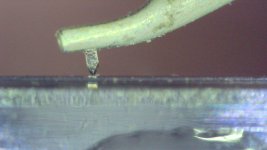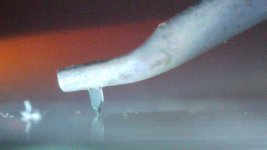Hi everyone.
I bought a Hana SL a few weeks ago, but I'm having some issues, with IGD in particular. I've tried all the various printed protractors (which have worked well in the past), but no luck this time. So, I was wondering if anyone has one of these for sale, or even if I could possibly borrow for a small fee etc? I'm based in Berkshire, UK. Thanks!
Chris
Edit: One of these popped up on ebay so I went for it. I was surprised how far out of alignment I was, as I thought Conrad Hoffman's arc protractor scaled correctly and on high-quality photo paper would be fairly accurate. The SL is sounding fantastic now and the IGD has reduced significantly. Now just to dial in the azimuth...
I bought a Hana SL a few weeks ago, but I'm having some issues, with IGD in particular. I've tried all the various printed protractors (which have worked well in the past), but no luck this time. So, I was wondering if anyone has one of these for sale, or even if I could possibly borrow for a small fee etc? I'm based in Berkshire, UK. Thanks!
Chris
Edit: One of these popped up on ebay so I went for it. I was surprised how far out of alignment I was, as I thought Conrad Hoffman's arc protractor scaled correctly and on high-quality photo paper would be fairly accurate. The SL is sounding fantastic now and the IGD has reduced significantly. Now just to dial in the azimuth...
Last edited:
The end result with our Feickert is exactly the same as a printed unit from Vinyl Engine. Easier but the same never the less.
The Feickert centers the protractor using the actual distance from the center of the tonearm bearing to the spindle. The protractor is therefore aligned by the tonearm to the spindle.
Ok, I'm sure in theory they do the same thing, I just want to rule out any problems like printing scaling issues, getting it centred on the spindle etc. which might be stopping me from aligning as accurately as possible.The end result with our Feickert is exactly the same as a printed unit from Vinyl Engine. Easier but the same never the less.
If the tonearms not mounted according to specs the tool comes in handy.The Feickert centers the protractor using the actual distance from the center of the tonearm bearing to the spindle. The protractor is therefore aligned by the tonearm to the spindle.
The difference is between the protractor centered by measuring or in the case of the printed type, by "eye". As much as I like my Feickert, a Wally Tools Wallytracker is even better.
But Wally isn't universal is it? I met Wally once at Rocky Mountain Audio Show. He told me that all the man needs is a Rega RB 600. I helped him to set up his kiosk and carried his wares to help the old , broke and crooked Polack in the land of plenty. RIP Wally!
The Hana SL is just about the hardest cart to set up due the Hana using the same cantilever on their 3 cartridges. As the Hana SL is a Shibata shaped stylus, Without a digital microscope it will be virtually impossible to set up if you do not have a arm with Vertical height adjustment, so you can set the correct SRA.
As others have said, The Feickert is only useful, and a of waste of money when setting up a new arm on a deck. I am not sure what you mean by IGD.
Cheers
As others have said, The Feickert is only useful, and a of waste of money when setting up a new arm on a deck. I am not sure what you mean by IGD.
Cheers
By IGD I mean inner groove distortion. I spent the day going through all the different protractors again, and I think I've finally sorted it out! I used Conrad Hoffman's custom arc protractor generator again, but this time I selected 'DIN' and not 'IEC' for the inner groove radius on a Lofgren A and it's all sounding pretty great now.The Hana SL is just about the hardest cart to set up due the Hana using the same cantilever on their 3 cartridges. As the Hana SL is a Shibata shaped stylus, Without a digital microscope it will be virtually impossible to set up if you do not have a arm with Vertical height adjustment, so you can set the correct SRA.
As others have said, The Feickert is only useful, and a of waste of money when setting up a new arm on a deck. I am not sure what you mean by IGD.
Cheers
I've got a VTA adjuster on my RB300, and also the Origin Live cartridge enabler so I can set azimuth somewhat. I do have a USB microscope that I used to take some okay close-ups of the stylus, but I need to spend a bit more time getting the lighting right to make the contact edge more visible to measure. The images I've attached weren't taken with the microscope perfectly adjacent to the shank so won't be great for measuring anything. Have you been successful in measuring SRA with a microscope by any chance?
edit: please note these images will all have different vta/sra as I did some with/without a mat and also different tonearm heights.
Attachments
Digital USB scope is the best way to check SRA for us mere mortals. The angle of the cantilever looks really close to 20°. There are also online protractors you can use to dial in.
Hi, Glad you got it sorted out, of your 4 photos No 3 is the correct alignment. I also use Conrad's alignment chart but always use "B" as I play mostly classical LP, which tend not to be as full as Rock etc.
For a good blog on SRA alignment see the attached link
https://www.google.com/url?sa=t&rct...opic=30673.0&usg=AOvVaw2LikMxfJbWVHGjTbVqTCgv
- mkane, the problem with the HAN is that they have fitted 3 totally different styli to one cantilever type, so the 20 deg rule will only be OK for one of them, but which one, nobody knows.
Last thing, now we know you are using a Rega arm, these are a bit light for the Hana range. So it would benefit to place a 3 - 4 mm brass spacer under the head-shell.
Cheers
For a good blog on SRA alignment see the attached link
https://www.google.com/url?sa=t&rct...opic=30673.0&usg=AOvVaw2LikMxfJbWVHGjTbVqTCgv
- mkane, the problem with the HAN is that they have fitted 3 totally different styli to one cantilever type, so the 20 deg rule will only be OK for one of them, but which one, nobody knows.
Last thing, now we know you are using a Rega arm, these are a bit light for the Hana range. So it would benefit to place a 3 - 4 mm brass spacer under the head-shell.
Cheers
Thanks for sharing that link, I'll be sure to check it out.Hi, Glad you got it sorted out, of your 4 photos No 3 is the correct alignment. I also use Conrad's alignment chart but always use "B" as I play mostly classical LP, which tend not to be as full as Rock etc.
For a good blog on SRA alignment see the attached link
https://www.google.com/url?sa=t&rct...opic=30673.0&usg=AOvVaw2LikMxfJbWVHGjTbVqTCgv
- mkane, the problem with the HAN is that they have fitted 3 totally different styli to one cantilever type, so the 20 deg rule will only be OK for one of them, but which one, nobody knows.
Last thing, now we know you are using a Rega arm, these are a bit light for the Hana range. So it would benefit to place a 3 - 4 mm brass spacer under the head-shell.
Cheers
When I use this resonance calculator (http://www.resfreq.com/resonancecalculator.html) I get a resonance of roughly 9Hz, so adding more weight would reduce that frequency, but isn't that something I wouldn't want? Or are the more factors involved that I'm not thinking of?
Thanks
Edit: just for reference, the RB300 is 11.5g effective mass, mounting screws and OL cartridge enabler ~1g and Hana 5g, so total 17.5g.
Last edited:
Hi, one of the problems with all Japanese cartridges is the way they specify their compliance at 100hz. In the west we use 10hz & that is the normal way for doing these calculations. So this conversion figure is a guesstimate , you calculate the compliance shown by 1.4 to 1.8. i always use 1.4 as is errs on the side of safety. The other problem is that Hana does not chow a compliance for the E or S cartridge, only the M range with is stated as 10. Therefore in Western terms this equates to a compliance of 14 to 18. However if you look at the ML it has a brass spacer fitted to it that makes it 4 grams heavier.
The best chart I have seen for checking the cart/arm compatibility is the Korf calculator. As it shows things graphically.
https://www.google.com/url?sa=t&rct=j&q=&esrc=s&source=web&cd=&cad=rja&uact=8&ved=2ahUKEwjc1OSpiOf1AhWFDuwKHQlkAZYQFnoECAwQAQ&url=http://korfaudio.com/calculator&usg=AOvVaw3TZBwCCUJnkZylN5_xdzusSo plotting the figurs into this chart shows that the Hana/Rega is just a acceptable match. However add the extra 4 gram's to the mix & that changes the combination to a good match. The heavier you make the arm go the better the match becomes.
Cheers
The best chart I have seen for checking the cart/arm compatibility is the Korf calculator. As it shows things graphically.
https://www.google.com/url?sa=t&rct=j&q=&esrc=s&source=web&cd=&cad=rja&uact=8&ved=2ahUKEwjc1OSpiOf1AhWFDuwKHQlkAZYQFnoECAwQAQ&url=http://korfaudio.com/calculator&usg=AOvVaw3TZBwCCUJnkZylN5_xdzusSo plotting the figurs into this chart shows that the Hana/Rega is just a acceptable match. However add the extra 4 gram's to the mix & that changes the combination to a good match. The heavier you make the arm go the better the match becomes.
Cheers
Thanks for explaining that, I was wondering why different dealers had it listed differently.Hi, one of the problems with all Japanese cartridges is the way they specify their compliance at 100hz. In the west we use 10hz & that is the normal way for doing these calculations. So this conversion figure is a guesstimate , you calculate the compliance shown by 1.4 to 1.8. i always use 1.4 as is errs on the side of safety. The other problem is that Hana does not chow a compliance for the E or S cartridge, only the M range with is stated as 10. Therefore in Western terms this equates to a compliance of 14 to 18. However if you look at the ML it has a brass spacer fitted to it that makes it 4 grams heavier.
The best chart I have seen for checking the cart/arm compatibility is the Korf calculator. As it shows things graphically.
https://www.google.com/url?sa=t&rct=j&q=&esrc=s&source=web&cd=&cad=rja&uact=8&ved=2ahUKEwjc1OSpiOf1AhWFDuwKHQlkAZYQFnoECAwQAQ&url=http://korfaudio.com/calculator&usg=AOvVaw3TZBwCCUJnkZylN5_xdzusSo plotting the figurs into this chart shows that the Hana/Rega is just a acceptable match. However add the extra 4 gram's to the mix & that changes the combination to a good match. The heavier you make the arm go the better the match becomes.
Cheers
I've used that compliance calculator before, but it doesn't seem to be working now, it's not showing on the webpage. Is it working for you? If I remember correctly my red line on the acceleration was near the top of the green zone, but if the compliance is as low as 14, then I would be a bit out.
I have some 3g headshell weights, but I'm not sure how well one would work with my OL cartridge enabler. I'll start off just by sticking one on the top with blu-tack and see how it goes. Thanks.
Hi, Yes the link is working for me, although it sent me to a re-direct page, which I clicked 7 whent to the Korf page.
Yes sticking the spacer on with Blue-tac will work fine, use it all the time.
Cheers
Yes sticking the spacer on with Blue-tac will work fine, use it all the time.
Cheers
I've done some experimenting with headshell weights and resonance test tracks on a Hifi News test lp. Using no headshell weights, the cart/tonearm vibrates between 14Hz to 8Hz. Adding a 3g weight reduces this to 13Hz to 9Hz, so a bit of improvement. However, when I swap the RB300's tungsten counterweight for steel (same weight, just different shape and larger diameter) and use no headshell weight I get the same resonance as if I was using the tungsten counterweight and the 3g headshell weight.
If it's giving me a similar resonance freq, then is there any benefit to using the tungsten with the headshell weight over just using the steel counterweight?
If it's giving me a similar resonance freq, then is there any benefit to using the tungsten with the headshell weight over just using the steel counterweight?
Hi DNic, do you mind if I pick your brain one more time? With the rb300 it's fairly common practice to set the VTF spring dial to maximum and set the VTF manually with the counterweight, although I'm sure the sonic benefits for doing this are debatable. In doing this the counterweight is further back on the stub, so this of course increases the effective mass of the tonearm and has an effect on the resonance.Hi, Yes the link is working for me, although it sent me to a re-direct page, which I clicked 7 whent to the Korf page.
Yes sticking the spacer on with Blue-tac will work fine, use it all the time.
Cheers
Would doing this have a similar effect on the sound to adding a headshell weight? Or is it more beneficial to have the extra weight on the headshell? Thanks.
Hi, No problem, however here I cannot help much. All I would say is that I do not like any springs on Tonearms as all springs will resonate, so I would remove it all together. Remember that as the Rega has a tapered arm tube there is vey little to worry about in resonance.
Possibly study what Audiomods used to do with their kit arm.
Cheers
Possibly study what Audiomods used to do with their kit arm.
Cheers
That's interesting to know how a tapered arm tube affects resonance, I didn't know that. I'll take a look at the Audiomods arms. Thanks for all of your help!Hi, No problem, however here I cannot help much. All I would say is that I do not like any springs on Tonearms as all springs will resonate, so I would remove it all together. Remember that as the Rega has a tapered arm tube there is vey little to worry about in resonance.
Possibly study what Audiomods used to do with their kit arm.
Cheers



